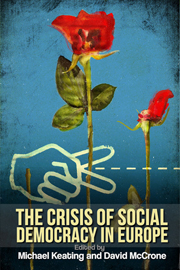Book contents
- Frontmatter
- Contents
- List of tables and figures
- About the contributors
- Preface
- 1 The crisis of social democracy
- 2 The Long Depression, the Great Crash and socialism in Western Europe
- 3 Social democracy in crisis: outlining the trends in Western Europe
- 4 The positions and fortunes of social democratic parties in East Central Europe
- 5 Rethinking public expenditure from a social democratic perspective
- 6 Social democracy in crisis? What crisis?
- 7 Can the Swedish social model survive the decline of the social democrats?
- 8 Multiculturalism, right-wing populism and the crisis of social democracy
- 9 Labour markets, welfare states and the dilemmas of European social democracy
- 10 Class politics and the social investment welfare state
- 11 Labour, skills and education in modern socio-economic development: can there be a social democratic economic and industrial policy in a globalised economy?
- 12 From single market to social market economy: is there room for solidarity?
- 13 Social democracy and security
- 14 Multilevel social democracy: centralisation and decentralisation
- 15 Conclusion
- Bibliography
- Index
8 - Multiculturalism, right-wing populism and the crisis of social democracy
Published online by Cambridge University Press: 05 October 2013
- Frontmatter
- Contents
- List of tables and figures
- About the contributors
- Preface
- 1 The crisis of social democracy
- 2 The Long Depression, the Great Crash and socialism in Western Europe
- 3 Social democracy in crisis: outlining the trends in Western Europe
- 4 The positions and fortunes of social democratic parties in East Central Europe
- 5 Rethinking public expenditure from a social democratic perspective
- 6 Social democracy in crisis? What crisis?
- 7 Can the Swedish social model survive the decline of the social democrats?
- 8 Multiculturalism, right-wing populism and the crisis of social democracy
- 9 Labour markets, welfare states and the dilemmas of European social democracy
- 10 Class politics and the social investment welfare state
- 11 Labour, skills and education in modern socio-economic development: can there be a social democratic economic and industrial policy in a globalised economy?
- 12 From single market to social market economy: is there room for solidarity?
- 13 Social democracy and security
- 14 Multilevel social democracy: centralisation and decentralisation
- 15 Conclusion
- Bibliography
- Index
Summary
Introduction
Globalisation and increased migration to and within Europe have led to a growth in nationalisms and anti-equality, anti-diversity and anti-human-rights agendas inside and outside the EU (Banting and Kymlicka 2006; Rydgren 2012b; Wodak et al. 2012). Migration from non-Western countries has changed the social and political landscape in the Nordic countries. Norway, Sweden, Finland and Denmark have a democratic tradition of including peasants, workers and women in politics and society (Bergqvist et al. 1999). With their universal welfare states and strong egalitarian traditions, these countries are often included among the most equal societies in international rankings, particularly by class and gender.
Nordic welfare states have been successful in economic terms, and the basic components of extended welfare policies and redistribution are today supported by mainstream political projects. Since the 1970s, the countries have developed extended gender equality policies which are supported by the political left and the right. Social equality, democracy and gender equality have today become crucial elements in the Nordic sense of national belonging. Yet there are serious problems in relation to accommodating ethno-cultural and religious diversity and including immigrant minorities as equal citizens (Brochmann and Hagelund 2010).
Multicultural policies for accommodating ‘complex diversity’ point to social and political contexts in which diversity has become a multidimensional and increasingly fluid empirical phenomenon (Kraus 2011). The challenge that multiculturalism presents for social democracy – to renegotiate principles of economic redistribution with recognition of diversity – has entailed intense debates within the Nordic contexts.
- Type
- Chapter
- Information
- The Crisis of Social Democracy in Europe , pp. 125 - 139Publisher: Edinburgh University PressPrint publication year: 2013



